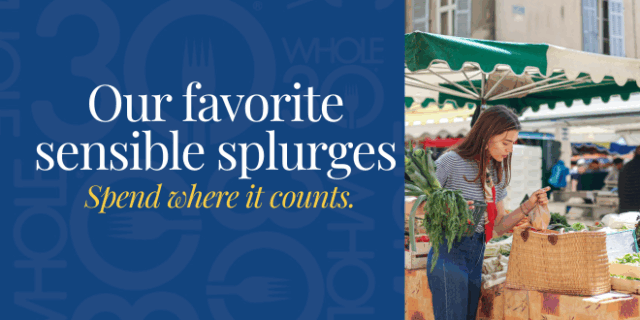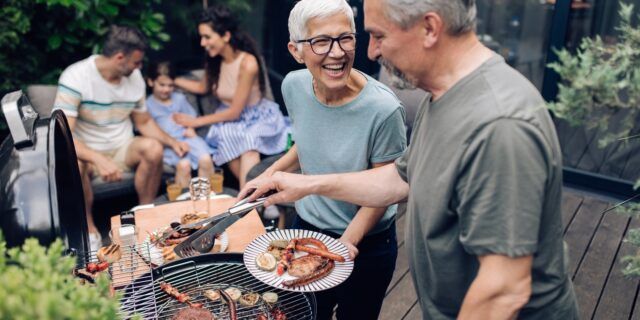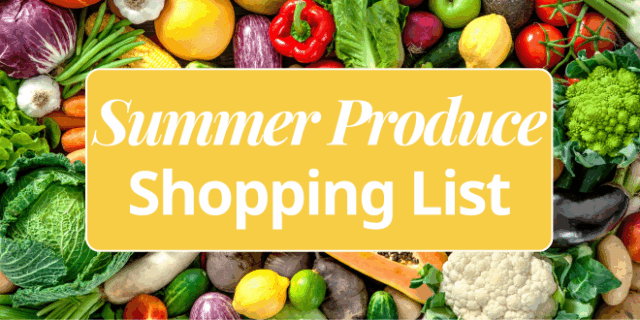In honor of Juneteenth, Whole30 has once again partnered with WANDA (Women Advancing Nutrition Dietetics and Agriculture) to amplify a unique and important conversation. This discussion will lead you on a journey through the past, present, and future of Juneteenth, also known as Freedom Day.
What follows is a conversation about Juneteenth traditions, foodways, the connections between food and freedom, and the future of the celebration. The discussion features four incredible women with Texas roots:
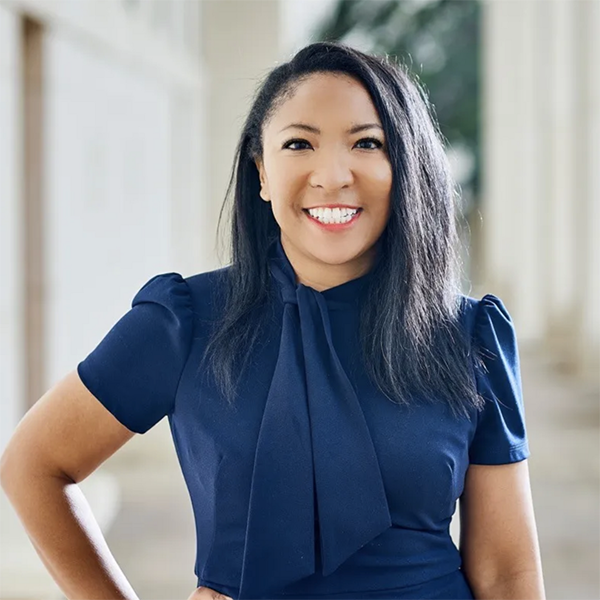
Deah Berry Mitchell, MA
Founder, Soul of DFW; and Founder, Nostalgia Black. Deah is based in Dallas, Texas and serves on the National Juneteenth Museum Board of Directors.
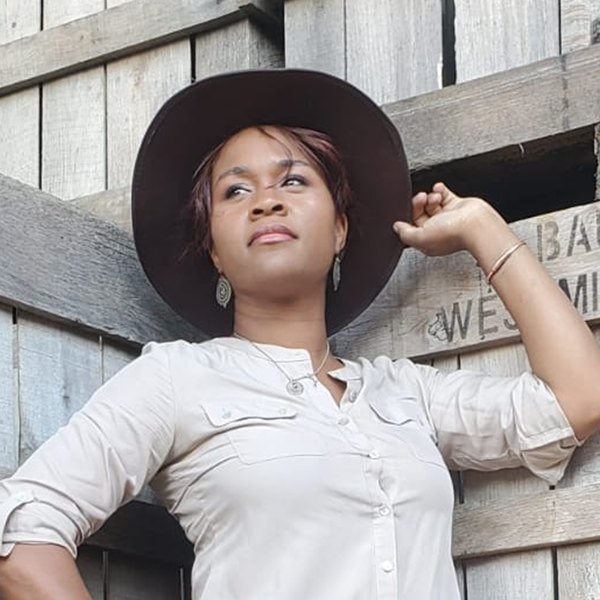
Tambra Stevenson
MPH, MA, Founder/CEO, WANDA. Tambra is based in Washington, Texas (born in Oklahoma and raised in Dallas, Texas) and serves on the National Food Museum Board of Directors.
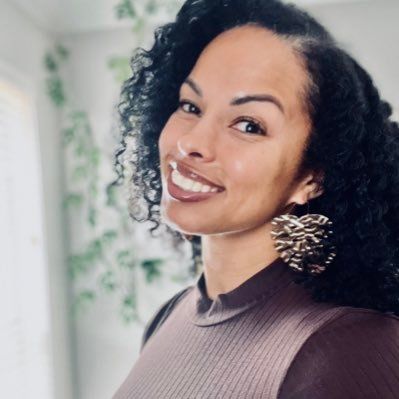
Ashley Hickson
DrPH, MPH, Dr Health Equity Advisor, CSPI. Ashley is based in Arlington, Texas.

Franciel Ikeji
MS, RDN, LDN, Nutrition Advisor, WANDA. Franciel is from Wiley, Texas and is now based in Silver Spring, Maryland.
Before diving into the conversation, it’s only appropriate to kick off this Freedom Day discussion with a tone-setting quote from Opal Lee. She’s known as the Grandmother of Juneteenth for her role in helping make the celebration a federal holiday. Here’s what she had to say about food and freedom in a 2022 profile in the Fort Worth Star Telegram.
“Juneteenth means freedom to grow and eat good nutritious foods. Our forefathers were not fed the best, but today we have the ability to choose to feed our families better. Young people please make the most of that freedom today.”
Opal lee
Whole30: How does the theme of honoring value, within you and food—from waste to worth—resonate for you during Juneteenth?
Franciel Ikeji: Many folks viewed enslaved African-Americans as waste, so when June 19, 1865 came, it was a time to publicly proclaim for everyone on the outside to take notice of the worth that we have always had. Juneteenth is a time to reflect on the value and worth we have always had within us, we’ve always had within our community, and, as a black people, we will always continue to have.
Ashley Hickson: During Juneteenth, I am appreciative and amazed at the powerful organizing that has sustained Juneteenth celebrations. The celebrations have persisted despite the horrific Black codes of the South, and the effort to dehumanize people. Because they knew their value, Juneteenth persisted, even before the internet or media coverage.
Whole30: What part of the Juneteenth story deserves more of a spotlight?
Tambra Stevenson: How we are reclaiming Juneteenth as an extension of food freedom, and the women who have been blazing trails as hidden figures of food. From historical figures like Harriet Tubman, who cooked to sustain her livelihood, and how Georgia Gilmore made meals to feed the Civil Rights movement, until to today with Karen Washington.
The story of Juneteenth (Freedom Day) is part of expanding the story of food sovereignty, making a livelihood out of food, cooking and growing our food on our own terms, and developing food policies that support our communities to thrive. That’s why we are championing for a Food Bill of Rights at WANDA and galvanizing community support. Learn more at iamwanda.org/foodbillofrights.
Ashley Hickson: Earlier Juneteenth celebrations were the result of grassroots advocacy and resistance. Following emancipation, White planters and people sought to maintain the racial hierarchy by enforcing Black codes in Texas. Some of these rules required formerly enslaved people to wear the same ragged clothing they received from their enslavers.
Juneteenth was a day that reflected resistance to this racial hierarchy, which is why people are so finely dressed in earlier photos.Throughout the years, the celebration attire became more lax, shifting from formal attire to embracing more Western and casual outfits in the parades. I am a fan of all of the iterations and evolutions of what is worn on Juneteenth, but the story behind the earlier photos and what they represent (resistance) is powerful to me because they could’ve been harmed pushing back against the terrorism of Jim Crow.
Whole30: What are the ingredients, dishes, and preparations or techniques that are most important to Juneteenth celebrations and traditions? And why do they hold these places of importance?
Deah Berry Mitchell: As for the celebratory foodways associated with Juneteenth, the menu is dictated by region. The evolution of traditional cuisines that have been largely consumed on this holiday such as barbecue, strawberries, and watermelon, were most likely eaten because either the fruits were in peak season during the month of June or, in the case of barbecue and its crimson sticky sauce, outdoor methods of preparing foods were common practice.
In other words, the reddish hue of the foods in these examples, had little, if anything, to do with symbolic meanings. However, just because they may not hold figurative significance based on color tied to my ancestors does not lessen the importance of their presence on our tables. As a fifth generation Texan, I hold many special memories assigned to these foods and our methods of preparation, which connect me to my familial lineage.
Franciel Ikeji: For me, BBQ is such an important cooking technique for Juneteenth celebrations and traditions. It is significant because we can trace its origins to the Caribbean and West Africa. Just as we can trace our Origins as a community to the Caribbean and to West Africa. The freedom we were granted on Juneteenth really allows us to hold on to and strengthen that connection to our origins in the Diaspora, our ancestors, families, and foodways.
Ashley Hickson: I grew up celebrating Juneteenth with BBQ (brisket specifically) and watermelon. We also celebrate with teacakes! Traditionally, red foods (including meats, fruit, desserts, and beverages) are quintessential Juneteenth dishes. In Texas, people who were enslaved in East Texas developed what is widely known as our signature dry rub style of BBQ. Dating back to slavery, BBQs were very special occurrences, as were making teacakes. After emancipation, people who were formerly enslaved kept these special-occasion dishes and integrated them into Juneteenth celebrations across the state.
Tambra Stevenson: Decolonizing our cuisines from being fried, died, and laid to the side is key to getting free from the idea and reality of food can killus. For Juneteenth, having vibrant, cultural produce—from black-eyed peas, luscious greens, melons, and refreshing beverages like ginger lemonade and hibiscus drinks—are important traditions for me. They speak to cultural identity and reclaiming our foods to heal us. We will be celebrating Juneteenth at the Sisterhood Supper. Learn more at iamwanda.org/sisterhoodsupper.
Whole30: How are the concepts of freedom that are so central to Juneteenth connected to food—in the past and today?
Tambra Stevenson: Food is an expression of freedom, which is why some Black people really don’t like the idea of controlling what they can eat or drink. Historically, food was controlled and weaponized. Meaning hunger was used as a tool to control populations, along with liquor which was given liberally during the winter holidays so enslaved people were too drunk to escape and seek freedom.
Ashley Hickson: The traditional foods for Juneteenth are examples of resistance to Black codes and collective liberation through food. By utilizing foods that were traditionally restricted to enslavers and largely used for celebrations only, the ancestors set the stage for Juneteenth being a [time] where we could be free, even if the world outside of the curated space didn’t see us as such. Present-day, this same energy persists and the remnants of Jim Crow and slavery still terrorize our communities; but on Juneteenth, we celebrate our resiliency.
Whole30: How have the traditional foodways around Juneteenth evolved as the celebration has become more visible in the mainstream media and culture?
Tambra Stevenson: Once a regional celebration, Juneteenth has become nationally recognized. From social media accounts, books, and media programs to events, more Juneteenth-themed initiatives have grown exponentially over the last three years alone. WANDA has hosted the Sisterhood Supper: Juneteenth Celebration in Washington, DC since 2020 to highlight Black women who have used food as a superpower to heal and nourish our communities. At the event, we created a Juneteenth menu celebrating the cultural foods—from jollof rice, greens and black eyed pea salad—created by Black women from the African Diaspora.
Ashley Hickson: I wouldn’t say they have evolved versus they have been corrupted and misconstrued, unfortunately. The further you get from the source and the roots of the event, the less authentic to the traditional foodways they tend to be. Commercialization has led to the commodification of a cultural celebration that has become watered down by companies and new observers.
Whole30: What are one or two widespread misconceptions about Juneteenth that should be corrected?
Deah Berry Mitchell: There are so many misconceptions attached to Juneteenth that it is sometimes exhausting to continually correct each of the narratives. From our food traditions to the typical ways we celebrate, much has been misconstrued. Beginning with the belief that the date, June 19, 1865, marked the end of slavery in the United States. In 2021 when the date was made a federal holiday, most (even some native Texans) were and still are unaware that this date did not signify the end of slavery. The Emancipation Proclamation, which abolished slavery effective January 1, 1863, only applied to the Confederate states, which included Texas. This meant that the other states, the Union and some defined as “border states,” still enforced slavery, and this continued until the ratification of the 13th Amendment.
Ashley Hickson: It is not the end of slavery in the United States, nor does it mark the official end of slavery. Juneteenth is a Texas holiday that reflects a celebration of the accepted date when we were notified. Slavery actually persisted in Texas after June 19, 1865, and it persisted in the United States in Delaware, Kentucky, and parts of New Jersey until December 6, 1865. This is why acknowledging regional celebrations (Eight O’ May in Mississippi, Emancipation Day in DC on April 16th, Emancipation May in Tallahassee on May 20th, etc.) is important.
Tambra Stevenson: That enslaved Africans were all free at the same time, which is not true. Even my own relative, Henrietta in Coriscana, Texas, was still the enslaved domestic labor to GW Speed’s family past 1900. She later died on June 15, 1908 after reuniting with her son, Jiles Burkhalter, in Eufaula, OK. I believe people didn’t know that there was variation of timelines when enslaved African people were emancipated in America. Ultimately, because a group of people benefited from the profit making and creating a lifestyle of convenience by having an enslaved labor force.
Ashley Hickson: The Juneteenth flag that has gotten more media attention in recent years was not created by a Texan or anyone from here; many of us have never seen this flag, and it hasn’t been prominent at any of our celebrations. It was developed by someone (Ben Haith) from Boston in 1997 who only learned about the celebrations while visiting an aunt in Virginia; as such, it’s pretty disconnected from widespread celebrations here. We tend to wear vibrant colors (purples, yellows, etc.) and some iteration of pan-African colors. The colors red, white, and blue actually evoke different feelings in the South than elsewhere, so it has been interesting seeing discourse on social media critiquing Juneteenth celebrations that don’t use the Ben Haith design or color scheme. Mind you, the “Juneteenth flag” wasn’t publicly flown until 2000, and we had 134 years of celebrations before then.
Deah Berry Mitchell: When we confuse major facts or unknowingly spread misinformation, an erasure of not only Black Texans’ legacies begins, but we also mistakenly ignore the other states who have a long history of celebrating their own dates of emancipation. Because of this, it’s imperative that we acknowledge that some other states hold a rich heritage of their own Black emancipation dates, both before and after June 19, 1865.
Whole30: Why is the connection to the land and farming so central to the past, present, and future of Juneteenth?
Tambra Stevenson: In relation to Juneteenth (Freedom Day), Black people were not free physically. Presently, we are physically free, but my concern is being mentally enslaved. And the future of freedom is to reimagine and actualize freedom on our own terms.
Ashley Hickson: Texas remains the state with the largest population of Black farmers, but farming in the Black community peaked in 1910. State-sanctioned violence, intimidating, lynching, and structural racism by banks and the USDA contributed to Black farmers losing 90% of the 16 million acres they owned by 1990. The American Bar Association values this land loss at $326 BILLION. Farming is an integral part of Juneteenth history as purchasing land to farm and host Juneteenth celebrations were critical to building independence from White planters. As someone who descends from farmers and people who were enslaved in Texas, it is extremely important to not overlook how land ownership curated the early efficacy and dignity of newly emancipated Black Texans.
Franciel Ikeji: The freedom afforded to enslaved black folks in Texas allowed us to buy land and own it rather than working the land and sharecropping on land that we could not pass on to the next generation. So connecting to the land with the freedom to grow and raise what we want all reflects that freedom that we did not previously have. We know that ownership of land is tied to economic freedom for us as a community; healthy food access; and the ability to grow our own food supports the freedom to be healthy and an end to food apartheid. We want to cultivate this connection so it grows and endures for generations.
Whole30: As knowledge of Juneteenth and popularity of the celebration grows, what Juneteenth traditions are in danger of disappearing? And how can we all make sure to protect these traditions?
Ashley Hickson: Juneteenth celebrations are more than just one day, and there are multiple events that take place across town where I live in Fort Worth (future home of the National Juneteenth Museum). Juneteenth is actually not about creating inclusive environments for non-Black people, and the idea isn’t to open up Juneteenth to the world for public consumption. I think it’s important to not feel compelled to do anything around Juneteenth if the holiday has not resonated with you before, as it may simply not be your culture (which is fine). Black people in the United States are not a monolith, and regional traditions and cultures will connect with everyone differently. However, if you choose to celebrate, look to Black Texans for norms and traditions as we have been doing it for a while!
Deah Berry Mitchell: Now that Juneteenth is an official federal holiday, each of us has a responsibility to educate ourselves on the authentic meanings and celebrate in ways that you deem appropriate, whether it be festive and jovial celebrations as past generations, or a more introspective day of remembrance.
Tambra Stevenson: Since Juneteenth means Freedom Day, it’s hard to determine what traditions are disappearing, since whom I to state how people choose to freely express what Juneteenth means to them? I think the critical point is to remember the 2.5 years lag time for emancipation to be announced in the South compared to the North. It speaks to regional differences even to this day.
Franciel Ikeji: As we celebrate during this time of jubilee, we can’t forget to teach the history and reflect on where we’ve been, the challenges we’ve overcome, and struggles still ahead of us. The best way to protect this history is to share it and center it in events and activities that mark such an important time in our history.
Visit WANDA’s website for more information on their mission and what you can do to support it. Also, check out one of these valuable resources to learn more about Juneteenth:











